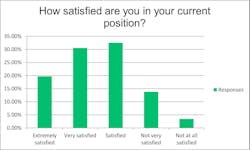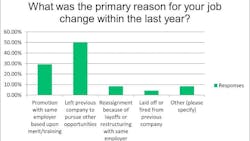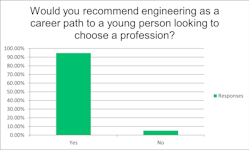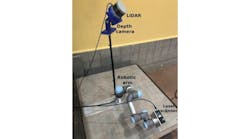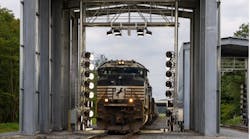Vision Systems Design invited its readers to take its annual Salary and Career Survey, which inquired about how they perceived their overall job and career. While it is safe to say that no career is perfect, and engineering has its share of ups and downs, you, VSD’s readers, have spoken, and, according to the responses, it appears that most of you remain pretty high on engineering.
More than 200 readers responded to our survey, with varying numbers of respondents answering individual questions.
Of 203 respondents, 66 (32.51%) reported being satisfied in their current positions, 62 (30.54%) reported being very satisfied, and 40 (19.70%) reported being extremely satisfied while 28 (13.79%) reported not very satisfied and 7 (3.45%) reported being not at all satisfied. Around 74% said they believe engineering is as promising for salary and advancement as it was five years ago, and nearly 95% said they would recommend engineering as a career path to a young person looking to choose a profession.
“Technology is everywhere,” notes one respondent. “Any enterprise of any size needs technology to function and grow.”
Many, but not all, like what they’re doing
As previously mentioned, most respondents have said they are satisfied with their careers and their present work situations. Of 242 respondents, 215 (88.4%) said they are in the same job they held last year while 27 (11.5%) said they are in different jobs from last year.
But that does not mean people aren’t doing tire-kicking. Of 24 people who responded to the question of why they changed jobs in the past year, 12 (50%) said they left to pursue other opportunities. Of 206 people responding to the question of whether they had considered leaving engineering entirely, 63 (30.58%) said they have considered leaving engineering completely, for a variety of reasons. The most common reasons given included the desire to try something different, do something more fulfilling or satisfying, or to do something less stressful and have more free time. Of 61 respondents, 19 (31.15 %) said burnout was a major reason for looking to get out.
Compensation is always a factor; 26 (42.62%) of those 61 respondents said they considered leaving to make more money and 18 (29.51 %) said they felt like there was no further chance of advancement for them.
However, even those who have thought about leaving don’t seem to be as concerned about such issues as machine learning or artificial intelligence replacing them (6 respondents, or 9.84%,reported this as a concern), nor did many seem to be down on the general job outlook (6 respondents, or 9.84% cited this as a concern). Other reasons, such as starting a business ( 17, or 27.87%) or retirement (10, or 16.39%) were more often cited as reasons for leaving engineering.
What’s the hot button?
“It’s never one factor,” Andrew Tilley, a senior recruiter with Actalent Services, notes. “People are motivated by a lot of things.”
Indeed, according to our survey, it appears that salary/compensation, while very important, is not the only factor contributing to career satisfaction. Compensation did score the highest, with 48 of 190 (25.26%) respondents rating it “critical” to job satisfaction.
Another critical factor cited was company culture and values; 48 of 191 respondents (25.13%) rated company culture and values as critical to overall job and career satisfaction. Researching potential design solutions and opportunity to design products that can benefit society also scored high as critical elements to job satisfaction.
As a recruiter in today’s job market, Tilley says it is important to be able to understand candidate motivations as well as company expectations, which requires deeper understanding of what each entity is seeking. Tilley, who has some 20 years’ experience in recruiting engineering candidates, agrees that salary and benefits are obviously very important factors, but focusing holistically on both candidate and company are going to yield the most positive and long-term employment solutions.
“I think what we’ve learned – particularly after COVID – is that we all have to collaborate a little better,” Tilley says. “We have to be willing, in certain places, to provide flexibility. It’s not always about paying somebody more. We really try to set the expectation to access the talent. If we do that right, then we have a much higher chance of success.”
General Demographic Snapshot
Of 175 respondents, 3 (1.71%) were under 25 and 43 (24.57%) were 60 or older; these were the smallest and largest numbers of respondents of all the age groups. The numbers trended upward with each older age group.
Of 177 respondents, 159 (89.93%) identified as male, 12 (6.78%) as female, and the remaining 6 (3.39%) declined to identify.
Of 177 respondents, 130 had a bachelor’s degree or higher, with 21 doctoral degrees, 64 masters degrees, 27 bachelors plus graduate studies, and 39 bachelor’s degrees reported.
The experience level breakdown of respondents was fairly even, with 8.37% reporting they have been in the field less than a year and 10.84% saying they have been in for 40 years or more. The breakdown was as follows:
· 5-9 years - 11.33%
· 10-14 years - 9.85%
· 15-19 years - 9.36%
· 20-24 years - 14.29%
· 25-29 years - 11.82%
· 30-34 years - 6.90%
· 35-39 years - 5.42%
Of 270 respondents, 198 (73.33%) reported being employed full time, with 43 (15.93%) reporting as being entrepreneurs/self-employed. Eleven respondents (4%) reported being part-time employees and another 6 (2%) self-identified as contract workers. Twelve respondents (4.4%) reported being unemployed.
Engineering is still a solid career
While a number of respondents said they have some concerns that fewer people are entering engineering—120( 64.7%) of 187 said they believe there is currently a shortage in the engineering talent pool—VSD’s respondents seem to mostly agree that engineering as a career is solid, rewarding, and lucrative, and would recommend engineering as a career path.
Tilley acknowledges the candidate pool may be smaller in recent years, especially after COVID, as many people across all industries left the workforce during the pandemic. However, good candidates are available, and even as the talent pool declines a little in the U.S., he says he works with a number of foreign nationals who want to work and live in the U.S.
Of 204 respondents, 151 (74%) of them said they believe a career path in engineering and the potential for salary advancement is as promising as it was five years ago. Of 191 respondents, 63 (32.98%) said their firms plan to increase the number of engineering jobs and 107 (56.02%) said their companies were at least planning to maintain their current numbers of engineering jobs. Finally, 182 (94.79%) of 192 respondents say they would recommend engineering to a young person looking to choose a profession.
“Engineers will always be needed,” one respondent notes.
More specifically, “industries are looking for and creating more jobs for those engineers who possess more handson technical experience with good management skills. These are the reasons that the companies are willing to pay better,” says another respondent.
Indeed, of 96 respondents, 26 (27.08%) expected their salaries to fall within $100,000-$124,999, 19 (19.79%) expected to make between $125,000 and $149,999, and 12 (12.5%) expected to make between $150,000 and $199,999, while another 8 (8.33%) expected to make between $200,000 and $249,999.
“Engineering remains very solid,” Tilley says. "Someone going into it should be able to build and enjoy a rewarding, lucrative, long-term career.”

